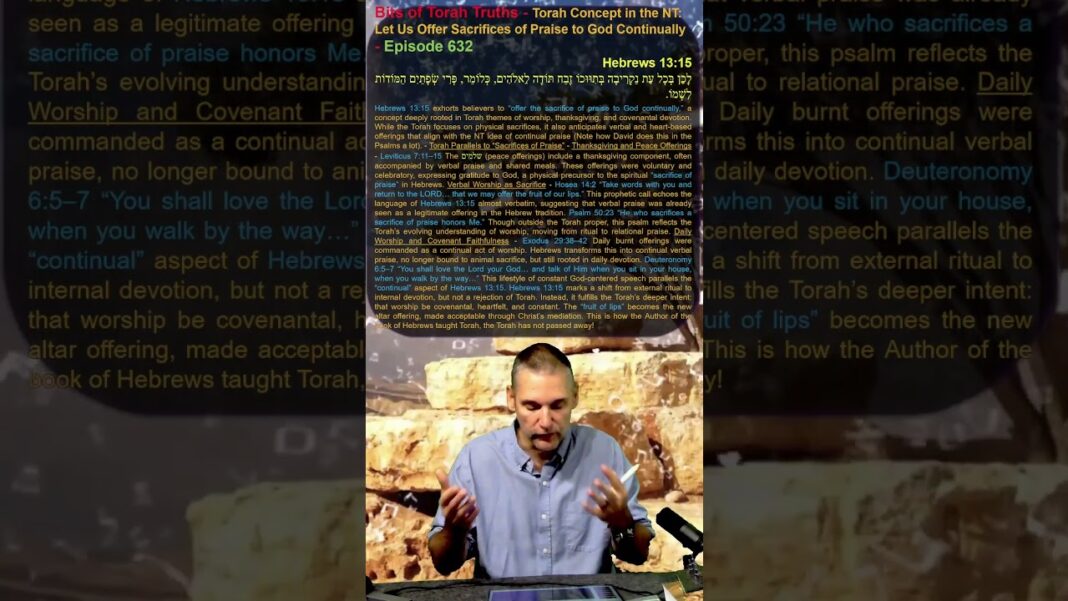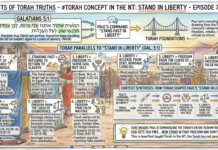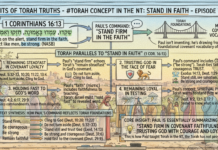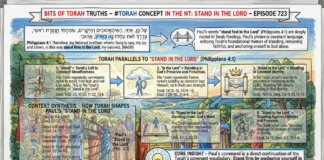Bits of Torah Truths – Torah Concept in the NT: Let Us Offer Sacrifices of Praise to God Continually – Episode 632
Hebrews 13:15
לָכֵן בְּכָל עֵת נַקְרִיבָה בְּתִוּוּכוֹ זֶבַח תּוֹדָה לֵאלֹהִים, כְּלוֹמַר, פְּרִי שְׂפָתַיִם הַמּוֹדוֹת לִשְׁמוֹ.
#torah#torahwisdom#torahtruth#torahforlife#torah4you#torahtruth
Hebrews 13:15
13:15 Through Him then, let us continually offer up a sacrifice of praise to God, that is, the fruit of lips that give thanks to His name. (NASB)
https://www.matsati.com/index.php/category/bits-of-torah-truths/
Hebrews 13:15 exhorts believers to “offer the sacrifice of praise to God continually,” a concept deeply rooted in Torah themes of worship, thanksgiving, and covenantal devotion. While the Torah focuses on physical sacrifices, it also anticipates verbal and heart-based offerings that align with the NT idea of continual praise (Note how David does this in the Psalms a lot). – Torah Parallels to “Sacrifices of Praise” – Thanksgiving and Peace Offerings – Leviticus 7:11–15 The שלמים (peace offerings) include a thanksgiving component, often accompanied by verbal praise and shared meals. These offerings were voluntary and celebratory, expressing gratitude to God, a physical precursor to the spiritual “sacrifice of praise” in Hebrews. Verbal Worship as Sacrifice – Hosea 14:2 “Take words with you and return to the LORD… that we may offer the fruit of our lips.” This prophetic call echoes the language of Hebrews 13:15 almost verbatim, suggesting that verbal praise was already seen as a legitimate offering in the Hebrew tradition. Psalm 50:23 “He who sacrifices a sacrifice of praise honors Me.” Though outside the Torah proper, this psalm reflects the Torah’s evolving understanding of worship, moving from ritual to relational praise. Daily Worship and Covenant Faithfulness – Exodus 29:38–42 Daily burnt offerings were commanded as a continual act of worship. Hebrews transforms this into continual verbal praise, no longer bound to animal sacrifice, but still rooted in daily devotion. Deuteronomy 6:5–7 “You shall love the Lord your God… and talk of Him when you sit in your house, when you walk by the way…” This lifestyle of constant God-centered speech parallels the “continual” aspect of Hebrews 13:15. Hebrews 13:15 marks a shift from external ritual to internal devotion, but not a rejection of Torah. Instead, it fulfills the Torah’s deeper intent: that worship be covenantal, heartfelt, and constant. The “fruit of lips” becomes the offering, made acceptable through Christ’s mediation. This is how the Author of the book of Hebrews taught Torah, the Torah has not passed away!









